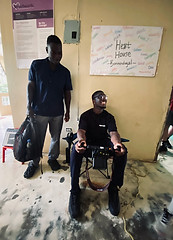top of page

A film by Elisee Junior St Preux
In the vibrant streets of Cap-Haïtien, a despondent young man embarks on a journey to reconnect with his estranged father. Accompanied by an inquisitive street kid, he races against time to share his father's parting words before it's too late. It is a surreal adventure that uses fantastical imagination to break generational toxic masculinity between a father-and-son. It explores mental health through a futuristic lens and insists on bringing vulnerability to the Haitian household.

If generational trauma can be passed down, so can generational healing



08/13/2024
PRINCIPAL PHOTOGRAPHY WRAPPED






















The Tropic Sun and His Eyes was filmed on location in Cap-Haïtien, Haiti
All donations are 100% tax deductible
We need your help to reach the light at the end of the tunnel. Your support will allow us to edit, color, compose music, and complete sound design for the film. All the elements that brings us to the finish line. After this stage, we work on getting the film to your screens!
.png)
We thank Hope Givers GA for believing in the project and fiscally sponsoring the film. They share our ground-floor approach to storytelling, and we are excited to work with them on bringing this story to life. We would love to have your support too. Please consider donating to the project and being part of our Tropic Sun community.
A Haitian Father-and-Son Story
We rarely get to hear our fathers say “I love you”, and we rarely have the confidence to say it to them. In this film, we imagine a world of transparency and vulnerability. The vast majority of men believe that the primary role of the father is to provide financial support for the family and to endorse the concept of male dominance. But many times, the son just wants to be loved. There is more to this relationship than manly deeds, and we should be able to explore it out loud.


Haiti Meets Mental Health
In this story, we depict what it looks like to face your trauma head-on and what it feels like to be free of it. The film moves like silk as we walk through the stages of depression and anxiety that our protagonist faces. The audience will experience a roller coaster of emotions that transitions from jubilant to bleak in a matter of seconds. Everything is natural and grounded. My team and I are not interested in showing Haitian caricatures for entertainment purposes. In other words, this is not the version of Haiti the media portrays. We are interested in showing Haitians simply as humans.

We use surrealism to show how Ruben longs to emotionally connect to his father. We use fantastical imagination to render the highest form of nostalgia as the street kid exudes the exhilaration and purity of a child. We intentionally play with the notion of what is real and what is in the mind of our protagonist Ruben, to enhance the spiritual aura of the film. The version of Haiti we explore is a mixture of the one my people know and love, and the one we hope it
to be.
Haiti Meets Fantastical Imagination
Our Tribe

Elisee Junior St Preux/
Writer/Director
Executive Producer
Elisee Junior St Preux is a Haitian-American Filmmaker born in Miami, FL.
A self-taught artist, business professional, and pure cinephile, Elisee is a Season 1 Director of Indeed's Rising Voices partnered with Hillman Grad Productions, a 53rd NAACP Image Awards nominee, a Sundance Ignite Finalist, an HBO Short Film Award recipient at the American Black Film Festival, a Year 2 Rideback Rise Circle Inductee, an NBAF Emerging Artist Horizon Award Finalist, a WEG Feature Film Lab Fellow, and a Netflix "Created By" Fellow where he held a script development deal to pen an original feature film with the studio.
Elisee is the owner of the multimedia company, "À La MODE Films" for Black artists that use the power of storytelling to uplift the Black experience on and off the screen. In addition to his creative work, Elisee is an Advisory Council member of the Morehouse Human Rights Film Festival, a brass musician, a community youth mentor, and a mental health advocate.
Ultimately designing his stories through fantastical re-imagination, generational healing, and nostalgia, Elisee insists on changing the stigmatized depiction of Black boys and their fathers with a more loving vulnerable image. His goal is to always bear witness and share stories that reflect today, honor the past, and reimagine the future.

Dawit Z. Adera/
Director of Photography
Dawit Adera, a cinematographer born and raised in Ethiopia, has loved storytelling from an early age.
He began making documentary and narrative films as a young adult and since then he has had works recognized in prominent film festivals including finalist on one of the top cinematographer festival Camera image.
Dawit is now based in the Los Angeles area and graduated from American Film Institute with an MFA in cinematography. Dawit has a passion for making meaningful films with thought-provoking endings.

Never again will I let my emotions control me
Media from our Location Scout
In June 2023, our team traveled to Cap-Haïtien, Haiti, and scouted the land. We analyzed the terrain, strategized logistics, and evaluated sites for every scene. We spent time with locals and built relationships with artists, entrepreneurs, and officials. Most importantly, we connected with Haiti on a deeper level for our film and ourselves.









.jpg)

.jpg)









The Sun represents the light we dream of. His Eyes represent the light we have.

Kenbe la!
bottom of page








